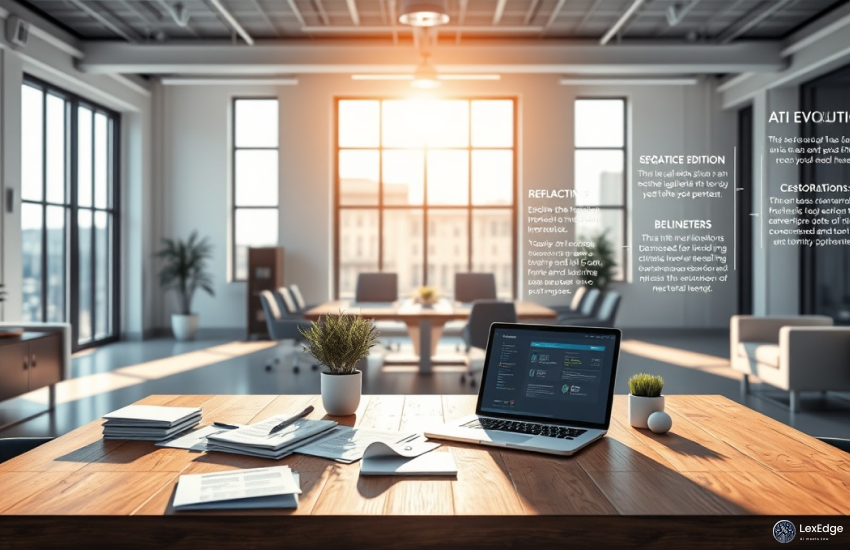Revolutionizing the Legal Industry with AI Legal Assistants

AI legal assistants are revolutionizing the legal industry by streamlining tasks such as contract drafting, compliance checks, litigation support, and legal research. Tools like Harvey, Leah, and CoCounsel are enabling firms to save time, reduce errors, and improve efficiency. While challenges remain—such as bias, ethical considerations, and data security—the future looks promising with multi-LLM systems, democratization of legal services, and strong industry partnerships.
The Evolution of AI Legal Assistants

The evolution of AI in the legal industry began with simple automation tools such as document management, keyword search, and e-discovery. Over the past decade, advancements in machine learning and, more recently, generative AI (GenAI) have empowered AI legal assistants to manage complex tasks like contract analysis, legal research, and document drafting with remarkable accuracy and human-like nuance. According to a Deloitte survey in 2024, nearly 88% of legal professionals reported that GenAI delivers substantial improvements in productivity and efficiency, making it a transformative force in modern legal services.
Comparative Analysis Leading AI Legal Assistants

Several AI legal assistant platforms stand out in 2025 for their specialization, performance, and seamless integration into legal workflows. Notable solutions include:
- Leah by ContractPodAI – Specializes in contract management and provides workflow automation tailored for mid-to-large organizations.
- Harvey Assistant – Excels in document Q&A and has been recognized for outperforming human lawyers in specific legal tasks.
- Thomson Reuters CoCounsel – Renowned for document summarization and robust workflow integration, making it a trusted enterprise solution.
- Spellbook – Integrates directly with Microsoft Word to enhance contract drafting, review, and compliance checks.
- Luminance & vLex Vincent AI – Focus on compliance, regulatory document handling, and advanced Q&A capabilities.
These platforms demonstrate how AI legal assistants are reshaping law firms and in-house legal departments by improving efficiency, accuracy, and compliance.
Real-World Applications

AI legal assistants are no longer just theoretical—they are being used in real-world applications that significantly improve efficiency and accuracy across the legal industry. Key use cases include:
- Contract Review – Tools like Leah and Spellbook streamline the contract drafting process while ensuring compliance and reducing manual workload.
- Legal Research – Harvey Assistant and CoCounsel deliver fast, reliable, and accurate answers to complex legal queries, saving valuable time for legal professionals.
- Litigation Support – Harvey also assists in generating case chronologies, reviewing evidence, and preparing case materials with improved accuracy.
- Due Diligence & Compliance – Platforms such as Luminance and vLex Vincent AI play a crucial role in regulatory reviews, compliance checks, and large-scale document management.
These practical applications demonstrate how AI in legal services is transforming traditional workflows, enabling firms to reduce costs, improve accuracy, and deliver faster results.
Challenges and Critical Viewpoints

While AI legal assistants bring major advantages, several challenges and limitations remain that legal professionals must carefully consider:
- Accuracy & Reliability – AI may struggle with nuanced legal interpretations, leading to potential errors in complex cases.
- Ethical Concerns – Transparency, accountability, and fairness in AI-driven decisions remain critical to maintaining trust in legal processes.
- Integration & Adoption – Many AI tools are complex and costly, making them difficult for smaller firms to adopt effectively.
- Data Security – Protecting highly sensitive client and case information is essential as AI becomes more deeply integrated into legal workflows.
Addressing these challenges is vital to ensure that AI in the legal industry delivers long-term value while maintaining ethical and professional standards.
Emerging Trends and the Future

The future of AI in the legal industry looks highly promising, driven by innovation and broader adoption across firms worldwide. Key trends shaping the next phase include:
- Multi-LLM Architectures – Leveraging multiple large language models to improve flexibility, accuracy, and reliability in legal tasks.
- Strategic Partnerships – Collaborations with leading firms such as KPMG and PwC are expanding the reach and practical applications of AI in law.
- Benchmarking Standards – Initiatives like VLAIR are creating frameworks that improve trust, accountability, and adoption of AI-powered legal tools.
- Democratization of Legal Services – As platforms become more intuitive and user-friendly, access to legal expertise is expanding, providing cost-effective support to underserved markets.
These advancements indicate a future where AI legal assistants not only streamline workflows but also make legal services more accessible, transparent, and impactful on a global scale.
Conclusion
AI legal assistants are not just a passing trend—they represent a fundamental shift in how legal services are delivered. From contract review to litigation support, these tools are empowering firms to work smarter and deliver more value to clients. By embracing innovation while addressing ethical and security concerns, legal professionals can future-proof their practices and lead in a rapidly evolving industry.

